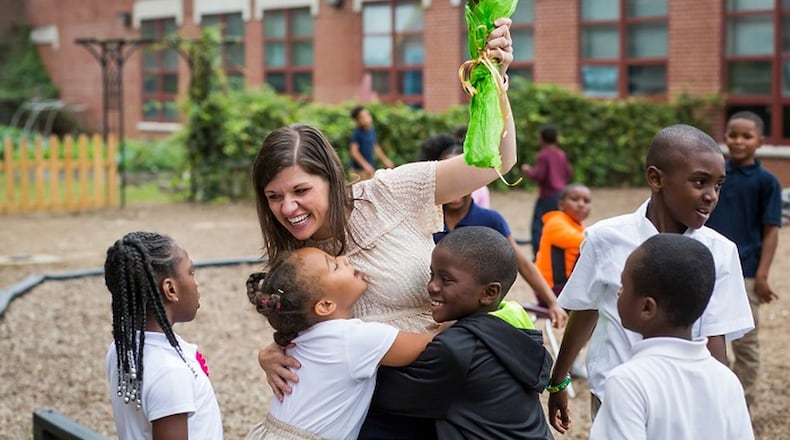When Atlanta teacher Tracey Nance Pendley meets parents of her students, she often tells them, "I won't believe everything your children tell me about you, if you don't believe everything they tell you about me."
Despite the contention that students are reliable narrators, there is, as Pendley describes it, a kid filter that sometimes overlooks context. (I’ve seen this in action. Back before our local elementary school was air conditioned, a friend's daughter reported the teacher turned off the overhead fan every afternoon near dismissal to punish the class for talking. It turned out the teacher turned off the fan so the kids could hear their buses being called.)
With back-to-school fanfare subsiding and students getting down to the business of learning, I talked to Pendley about what parents could do to improve their child's experience this year. Pendley is Georgia's 2020 Teacher of the Year, and a beloved staff member at Atlanta's Burgess-Peterson Academy.
Here is her advice:
Trust your child's teacher: If you have concerns, ask to sit in the class. Observe. "Most teachers are super welcoming. You can sit in a class for five minutes and tell whether the children are loved by how teachers talk to the class, their proximity to students, whether they talk to them at eye level,'' she said.
Be present: "Let the teacher know you are there. You want to be involved. I tell parents you are my partner in your child's education. You pass the baton to me in morning, and I pass the baton back to you in the afternoon."
(This was not Pendley's experience in her chaotic childhood. Because her single mother was an addict and died when Pendley was a young teen, the chief supportive adults in her life were the teachers at the nine different schools she attended.)
Encourage a growth mindset in kids: "I frequently hear parents say John isn't good at math or Carly has terrible handwriting. Kids listen when you talk to their teachers about them. Parents forget the brain is a muscle, and it can grow. Practice any skill repeatedly and you will improve, you will get good. Our children need to know this."
Teach children to love their mistakes: "When parents tell children, 'You better get all As,' that puts fear in the child and creates anxiety." Instead, when a child gets a bad grade, Pendley said, "Ask them what was the favorite mistake they made and what they can learn from it."
Don't overload students with activities: "Children need time to play and be silly and be with their parents."
Encourage kids to take ownership of learning: "I can't tell you how many texts I get from parents that their child left their homework on the counter, and please don't take any points off. Students freeze in the middle of class presentations because they can't make out their parents' handwriting on the presentation cards. Ultimately, let kid do the work. By first grade, a child should be able to sit and do their homework and parents should check it. By second grade, a child should be reading to the parent for at least 20 minutes."
(If a school is assigning excessive homework, Pendley urges parents to confer with teachers and the administration to formulate a policy that limits homework to the recommended 10 minutes per grade level, so a second grader would have no more than 20 minutes of homework, while a six grader would have no more than an hour.)
Address bullying with teacher: "The first step is to reach out to teacher about it. If it continues to happen, reach out to the school counselor. But understand what bullying is. There is a large misconception about what bullying actually is. Some kid jumping in front of you in line for the water fountain is not bullying. We have to help our kids understand that bullying is repeated abuse, and that they definitely should tell someone. The truth is that teachers don't hear every conversation on the playground. If the child doesn't tell us, we can't help fix the problem."
If your child has a hard time making friends: See if the teacher can help. Pendley had a little boy who was not joining any of the recess fun. She found another child whom she thought might be a good match. She talked to both set of parents, telling them the pair might hit it off. The parents connected the boys, and they became pals.
Get to know the principal: "Good principals are going to make themselves seen, so parents will know the principal. A principal's leadership style can make or break the school culture. The strongest principals I have seen have an open-door policy. If you, as a parent, are not seeing the principal, go in and introduce yourself."
Learn about the resources in your school: Schools have counselors, psychologists and speech and occupational therapists. "There are so many people in the building who can support them and their children. Schools send home a lot of helpful information in backpacks, and parents ought to check. Join the PTA. It's only $5 to join."
About the Author
The Latest
Featured



